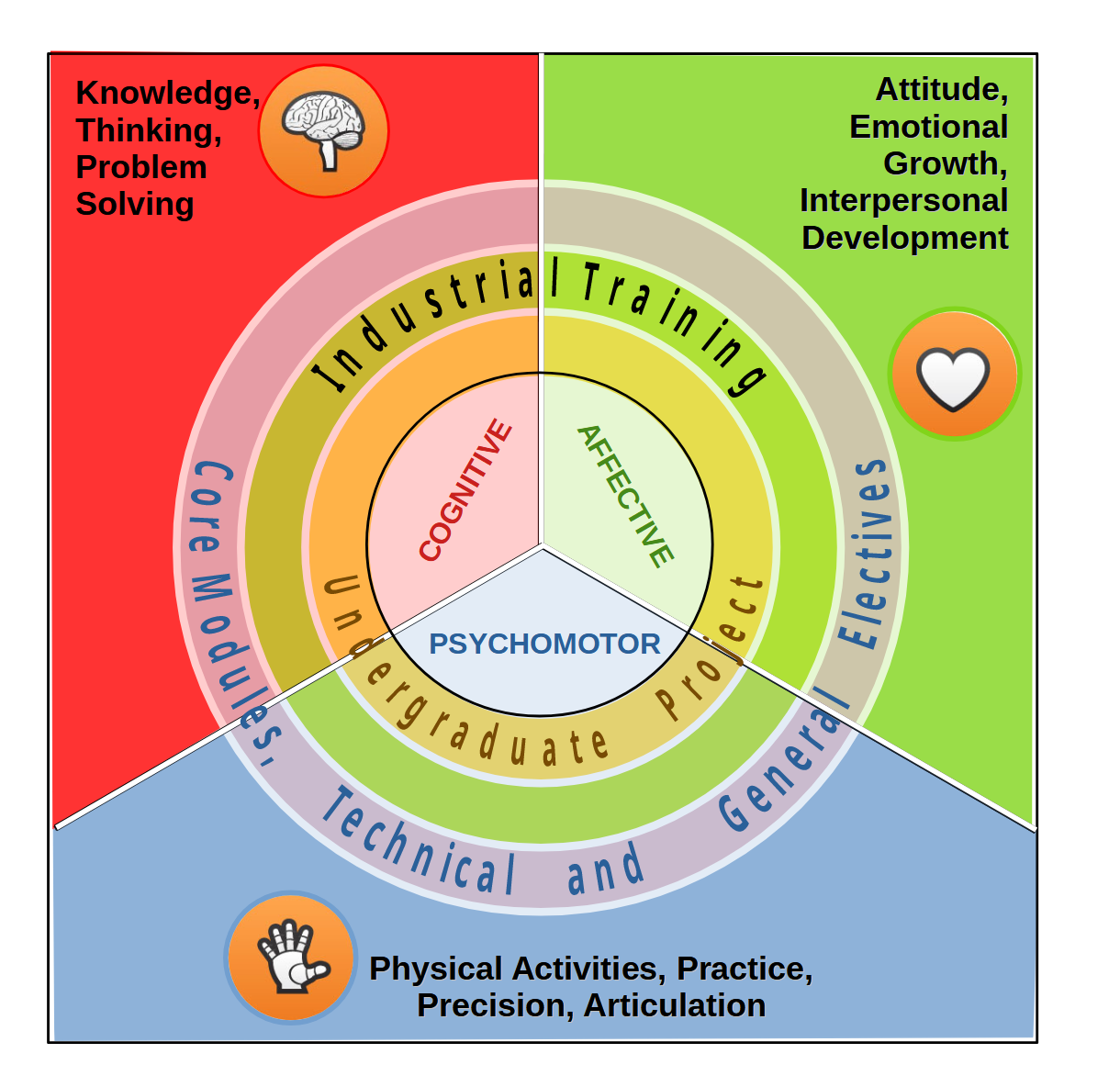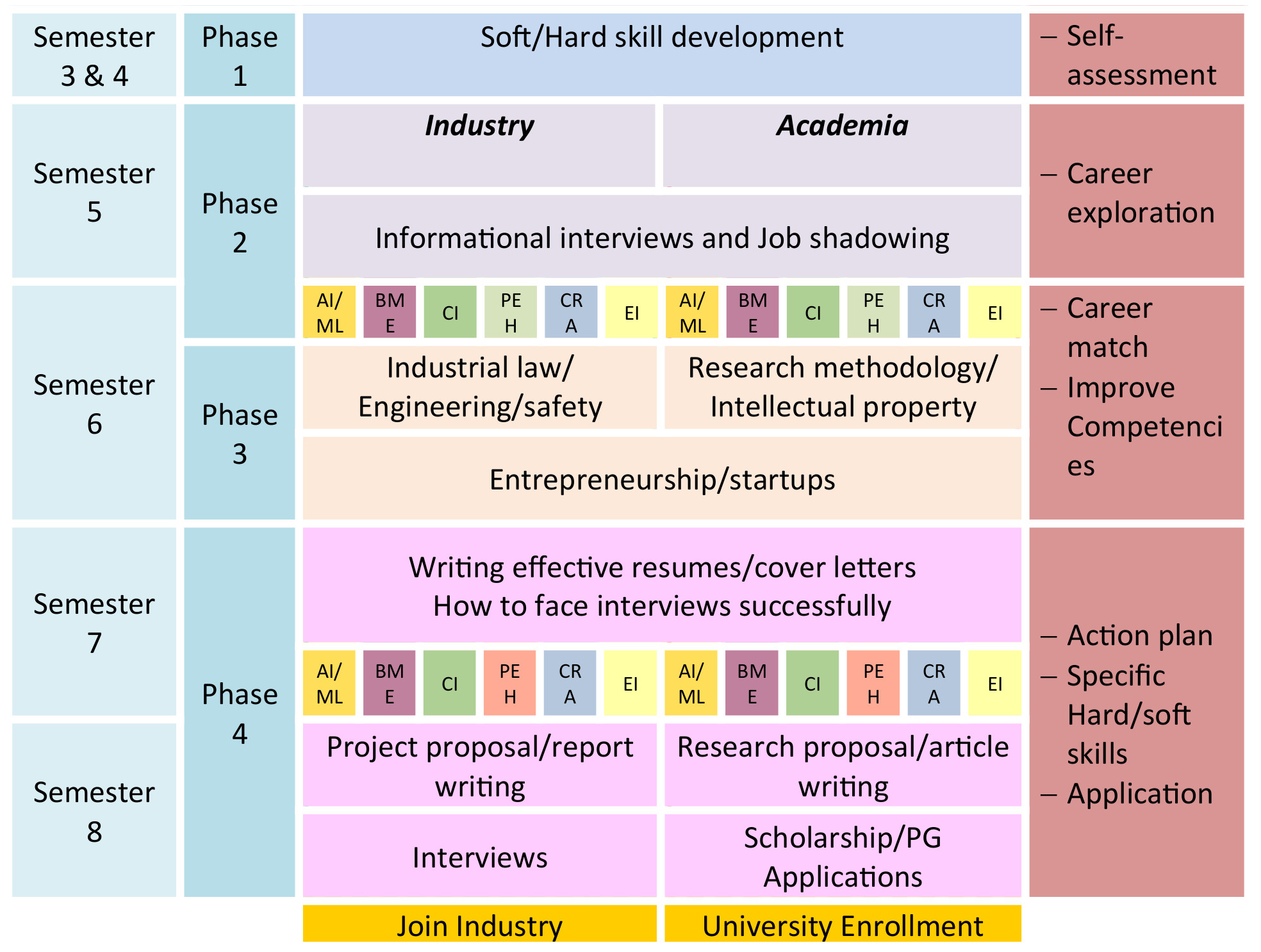INDUSTRIAL TRAINING
Industrial training is the first opportunity for undergraduates to observe individuals at different job hierarchy and industrial relations, organization, maintenance, safety and environmental procedures from the point of view of the general workforce. It is also an important component in the preparation for a career as a professional engineer by taking part in supervised and planned work in real-world industrial environment (IESL, 2021). Further, the training program is a platform for our undergraduates to gain not only technical knowledge and skills but also non-technical soft, interpersonal and social skills, experience in work ethics and professional conduct, etc. Therefore, for the students, the learning can happen in all three domains: cognitive (knowledge, thinking), psychomotor (skills, physical activities) and affective (attitudes, emotional and social), during the industrial training period as well.

TR400: Industrial Training Course
Industrial Training (TR400) is a course offered for the engineering undergraduates who are following the Specialization Programme in Engineering. TR400 is a six (6) credit course and the successful completion of the course is a mandatory requirement to claim the degree of Bachelor of the Science of Engineering (B.Sc.Eng.). The Industrial Training and Career Guidance Unit (ITCGU) in the Faculty of Engineering, University of Peradeniya is responsible for arranging, monitoring and evaluating the industrial training in liaison with the National Apprentice and Industrial Training Authority (NAITA).
Non Technical Skills and Attitude
Present day employers seek engineering graduates who are good not only in technical skills but also in soft or non-technical skills especially to complement their technical skills. Such a set of skills together with the attitude of life-long learning are adding values for the Engineering Graduates to be more employable in the 21st century industry. Therefore, the Department encourages students to develop or improve such competencies during the industrial training period as it provides opportunities or a platform to work in a team, under pressure and dealing with people from all levels of the organization.
AIMS and OBJECTIVES
The AIM of the TR400 course is to provide an industrial exposure for the students to acquire, develop, and demonstrate the requisite knowledge, professional skills, work ethics and attitudes which will be useful for the smooth transition from academic environment to professional engineering working environment at the completion of the undergraduate degree programme.
The OBJECTIVE of the IT program is to produce, knowledgeable, skilled and experienced graduates who are ready to face the real working environment. Apart from this, the training experience will further solidify the on-campus learning process and activities, while providing engineering undergraduates with the relevant work experience.
Intended Learning Outcomes: The students should be able to,
CAREER GUIDANCE
Many studies on the profiles of university students suggest a diversity of needs for career guidance and counseling programs. Past research has consistently shown that almost one-half or more of undergraduate’s seek for help with educational and professional planning (Litoiu and Oproiu, 2012). Throughout their undergraduate period or even in future careers, they encounter many situations when they could benefit from impartial or neutral advice. He or she may be in the process of choosing a career, deciding whether or not he/she should change careers or jobs, re-entering the workforce, job hunting, or even recovering from a job loss. This is an overwhelming process for an undergraduate and thus the department has introduced a Career Guidance and Counseling program to support DEEE students in their career planning process.
The University (CGU) and also the Faculty (ITCGU) has a Career Guidance unit to support students by providing career mobility and increasing career aspiration through career fairs etc.
What is Career Guidance?
Career guidance refers to services intended to assist people, of any age and at any point throughout their lives to make educational, training and occupational choices and to manage their careers. Career guidance helps people to reflect on their interests, ambitions, abilities and qualifications. It helps them to understand the labor market and education systems and to relate that to what they know about themselves. It also promotes equity or fare mindness; recent evidence suggests that social mobility relies on wider acquisition not just of knowledge and skills, but of an understanding about how to use them. In this context, the mission of career guidance is widening, to become part of lifelong learning. In our program, Career Guidance is dedicated to bridge the skill (SOFT and HARD) gap among DEEE students and to build well rounded individuals to meet the present day workforce requirements.
Career Guidance Program
The AIM of the program is to impart the knowledge, skills and attitude to improve personality, interpersonal relationships and emotional intelligence so that the student become well rounded individual (Graduate profile) to meet the present day workforce requirements either in academia or in industry.
OBJECTIVES
- Enhancement of career development competencies of DEEE students by organizing career skill development workshops, seminars, personal career mentoring, etc.
- Counseling on career exploration and planning for prospective students.
- Career Guidance and Counseling to all DEEE students from the third semester onwards to focus on their future careers.
- Counseling with regard to behavioral competencies.
- Facilitation of student welfare activities.
- To develop a database of online job training opportunities and job placement.
- Organize career fairs to provide opportunities for prospective employers to meet undergraduates and graduated students.
Program Action Plan - 4 Steps
Program Structure and Program Activities

Career Guidance and Counselling
The students are also encouraged to approach the Faculty ITCGU and the University Career Guidance Unit as well. The workload and the competition of the program may lead to stress related depression in many of the engineering students. Fortunately, university provides such psychological support through the Health Center or other established units.
Destination of Our Graduates
MOTIVATION - Our graduates continue to uphold the innovative and top-tier reputation of the DEEE at University of Peradeniya.


